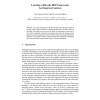Free Online Productivity Tools
i2Speak
i2Symbol
i2OCR
iTex2Img
iWeb2Print
iWeb2Shot
i2Type
iPdf2Split
iPdf2Merge
i2Bopomofo
i2Arabic
i2Style
i2Image
i2PDF
iLatex2Rtf
Sci2ools
108
click to vote
KES
2005
Springer
2005
Springer
Learning Within the BDI Framework: An Empirical Analysis
One of the limitations of the BDI (Belief-Desire-Intention) model is the lack of any explicit mechanisms within the architecture to be able to learn. In particular, BDI agents do not possess the ability to adapt based on past experience. This is important in dynamic environments since they can change, causing methods for achieving goals that worked well previously to become inefficient or ineffective. We present a model in which learning can be utilised by a BDI agent and verify this model experimentally using two learning algorithms.
Bdi Agent | Explicit Mechanisms | KES 2005 | Model |
Related Content
| Added | 28 Jun 2010 |
| Updated | 28 Jun 2010 |
| Type | Conference |
| Year | 2005 |
| Where | KES |
| Authors | Toan Phung, Michael Winikoff, Lin Padgham |
Comments (0)

